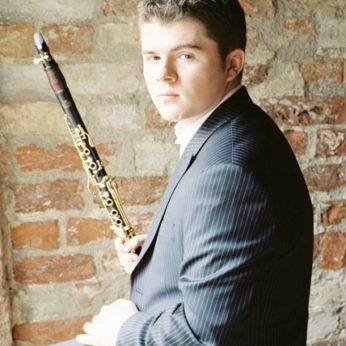Composer: Wolfgang Amadeus Mozart (b. 1756 - d. 1791)
Performance date: 01/07/2014
Venue: Bantry Library
Composition Year: 1786
Duration: 00:18:06
Recording Engineer: Richard McCullough, RTE
Instrumentation Category:Trio
Instrumentation Other: cl, va, pf
Artists:
Julian Bliss -
[clarinet]
Lise Berthaud -
[viola]
Philippe Cassard -
[piano]

One of Mozart’s close friends in the late
1780s was Gottfried von Jacquin, son of Professor Nikolaus von Jacquin, a
prominent botanist. Gottfried was slightly younger than Mozart and shared his
boisterous sense of humour. He had a fine bass voice and Mozart wrote several
works for him, as well as giving him composition lessons, and his sister
Franziska was also his piano student. Both Mozart and Constanze, his wife,
spent many happy evenings at their house making music, Constanze being a fine
soprano and Mozart a tenor. There is a famous humorous trio for Mozart,
Constanze and Gottfried and string accompaniment entitled Liebes Mandel, wo ist’s Bandel? (Dear little husband, where is the
ribbon?). The multi-talented Mozart was also a viola player, and another
guest at the Jacquin household was the clarinettist Anton Stadler; so this is
doubtless the reason for the unusual combination of instruments in this trio,
where Franziska would have played the piano part.
The scholars are a bit snooty about the Kegelstatt (Skittle-Alley) story,
suggesting that it was muddled with another incident where the Horn Duos K487
manuscript was dated 27 July 1786 while
playing skittles. The Kegelstatt was
finished on 5 August, only a few days later, so it seems equally possible that
Mozart was going through a skittles craze, and was composing between his turns.
At any rate the story suits the light-hearted nature of the music. Nissen, who
was Mozart’s biographer and Constanze’s second husband, describes an occasion
from 1787: Mozart composed several
numbers for his opera Don Giovanni while playing skittles in the garden of his
friend Duschek, which lay just outside the city. When it was his turn to play
he stood up; but no sooner was it over with than he returned to his work,
without being distracted by the talk and laughter of those about him.
Copyright © 2025 West Cork Music. All rights reserved.
Designed and developed by Matrix Internet